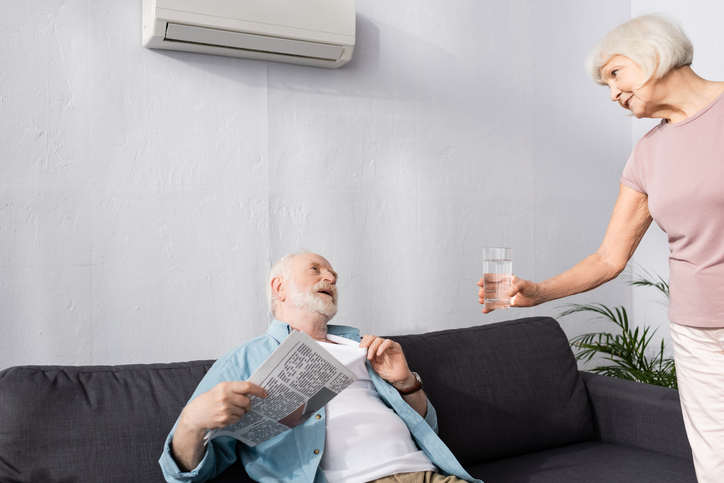How to Cope with Record-Breaking Heat and Care for your Elderly Loved Ones
The world is experiencing unprecedented heat waves this year, and Canada is no exception. In July 2023, the global average temperature reached two consecutive record highs of 17.01°C and 17.18°C, according to the University of Maine’s Climate Reanalyzer. Parts of Canada were under extreme heat warnings and air quality advisories due to wildfires across the country.
But even before that, in June 2021, Canada broke its national heat record three times in a row, when the small village of Lytton in British Columbia soared to a scorching 49.6°C (121°F), which was hotter than any temperature recorded in Europe or South America, and tied with Death Valley, California, for the highest temperature in North America that day. Lytton was later destroyed by a wildfire that engulfed the town.
One example of the ecological impact of the heat wave was the June 2021 heat wave in BC that affected beach sea life, especially mussels, because they are not accustomed to this kind of heat. Mussels are filter feeders that help clean the water and provide habitat and food for other organisms. They are also an important source of income and food for many Indigenous communities and coastal residents. The researchers estimated that more than 100 million mussels died on a single beach in British Columbia during the heat wave, leaving behind piles of empty shells. The loss of mussels could reduce water quality, increase erosion and expose other animals to predators and disease.
These may not seem like excessive temperatures in many parts of the world, and including North and South America, however, it is important to remember that Canada isn’t equipped to handle heat of this magnitude. We are well prepared for excessively cold weather, and enjoy mild, warm summers that are tolerable to us, and our ecosystems. One really good example; Most Canadians don’t have air conditioning in their homes and many don\’t have air conditioning in their vehicles. Our homes are built to welcome and enjoy the sun, especially during our long, cold winters when daylight can be brief and outside is bitter cold.
These extreme temperatures are not only uncomfortable, but also dangerous, especially for the elderly and those with chronic health conditions. According to Health Canada, heat-related illnesses can include dehydration, heat exhaustion, heat stroke, and even death. Older adults are more vulnerable to heat stress because they may have reduced ability to sweat, impaired circulation, chronic diseases, or medications that affect their body’s response to heat.
If you have aging parents or loved ones who live alone or need assistance, you may be worried about how to ensure their well-being during these heat waves. Here are some tips on how to help them cope with the heat and stay safe:
– Check in on them regularly by phone or in person, if possible. Ask them how they are feeling, if they have enough water and food, if their air conditioning or fans are working properly, and if they need any help or support.
– Encourage them to drink plenty of fluids, preferably water or juice, and avoid alcohol and caffeine, which can dehydrate them. Remind them to drink even if they are not thirsty, as thirst is not a reliable indicator of hydration.
– Help them find a cool place to stay during the hottest part of the day, such as an air-conditioned public building, a mall, a library, or a community center. If they have to stay at home, advise them to close the curtains or blinds, open the windows if there is a breeze, and use fans or wet towels to cool down.
– Make sure they wear light-colored, loose-fitting clothing made of breathable fabrics, such as cotton or linen. Avoid dark colors and synthetic materials that can trap heat and moisture. If they go outside, remind them to wear a hat, sunglasses, and sunscreen to protect themselves from the sun.
– Watch out for signs of heat-related illness, such as headache, dizziness, nausea, vomiting, confusion, weakness, rapid breathing or pulse, or fainting. If you notice any of these symptoms in your loved one, call 911 immediately and try to cool them down by moving them to a shady or cool place, applying cold water or ice packs to their skin, and giving them sips of water if they are conscious.
– Consider hiring in-home care services to check in on your loved one and help them with daily tasks such as cooking, cleaning, bathing, or medication management. In-home care can provide peace of mind for both you and your loved one during these challenging times. You can find reputable and affordable in-home care providers online or through referrals from your doctor or local senior center.
Heat waves are becoming more frequent and intense due to climate change. We need to take action to reduce our greenhouse gas emissions and adapt to the changing conditions. But we also need to take care of ourselves and our loved ones who may be at risk of heat-related illnesses. By following these tips, you can help your aging parents or loved ones stay cool and safe during these hot days.
At Coast Care (formerly Sunshine Coast Senior Care), we care about the health and happiness of our clients and their families. If you need any assistance with home care services for seniors in British Columbia, please contact us today . We would love to hear from you and discuss how we can help: Visit our website at CoastCare.ca for more information on how we can help you and your loved ones.
Stay cool and stay safe!

